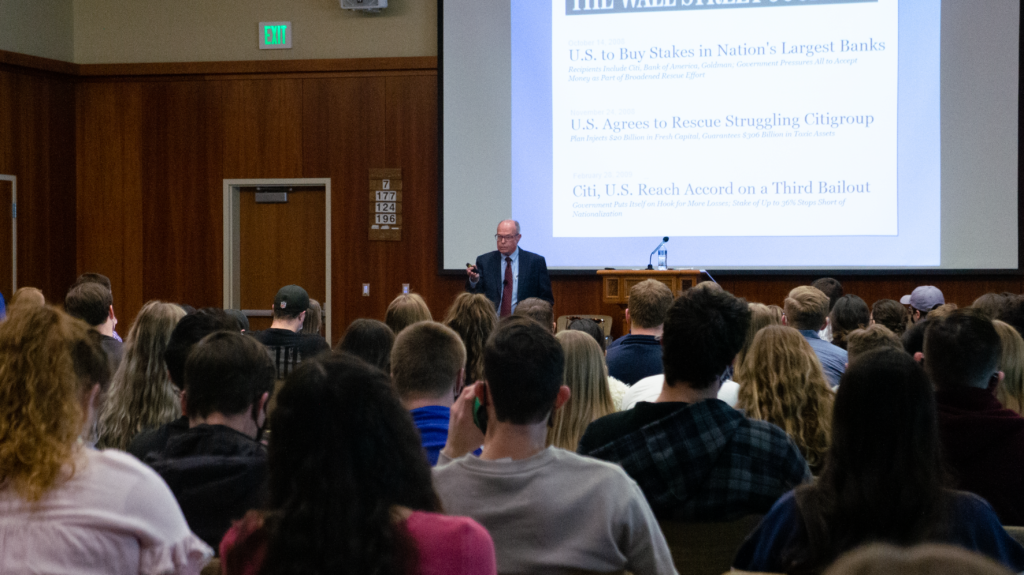
It was my great honor to speak again at the Marriott School of Management at Brigham Young University last week. I last spoke at that wonderful university three years ago, before the pandemic, when I saw how totally committed BYU is to ensuring that all of their students have a good foundation in ethics and integrity. In fact, unlike many universities, BYU teaches ethics classes in all disciplines.
Mark Zimbelman, the Mary and Ellis Professor of Accounting, organizes the accounting ethics talks and has done extensive research in the prevention and detection of fraud. Professor Zimbelman said that at BYU they reinforce their ethics and integrity curriculum by having their students hear real whistleblower stories and learn the lessons coming from them regarding breakdowns of ethics and the significant costs associated with unethical behavior.
Prior to my talk, the core accounting students were assigned to watch the PBS documentary “The Whistleblower” about Sherry Hunt and her futile attempts to address identified serious mortgage underwriting breakdowns at Citigroup before I was promoted to Business Chief Underwriter and became her boss.
While at BYU, I told the students about my issuing warnings for eighteen months and ultimately sending a detailed warning about the underwriting issues and large unrecognized losses to Robert Rubin, the newly-elected Chairman of the Board, and the other executives the day before a scheduled meeting of the board of directors. And that, after I was told not to come back to the bank, I went to the Securities and Exchange Commission three months before the bank bailouts and gave nationally televised testimony to the Financial Crisis Inquiry Commission, with both the SEC and the FCIC going to great lengths to cover up my testimony.
While sharing my experiences was important, we also talked about how the students can identify whether or not a corporate culture is an ethical culture, and discussed some in-depth research conducted by the highly respected Ethics and Compliance Initiative which definitively shows that ethical management and corporate cultures truly want and respect employee feedback. And the employees know this and thus readily report misconduct they observe. This is contrasted with less than ethical corporate cultures where employees reporting misconduct become subject to retaliation, thus implicitly telling the employees that misconduct is condoned by management.
Some of the students’ feedback on my talk has yet again affirmed my resolve to continue sharing business ethics and what happens when we stray from, or don’t have any, corporate ethical codes.
Here is some of the BYU student feedback about my talk:
I learned the importance of persistence and sticking to your moral standards. I also learned the importance of asking questions when you are asked to do something that makes you feel uncomfortable. It’s ok to push back and seek an explanation when you are put in a tough situation.
I was really surprised to learn about the great lengths that were taken by many parties involved to keep his story from being heard. This showed me that there really is great opposition when we are trying to do the right thing and made me hope that I would have the courage and endurance needed were I to be faced with a similar situation.
I came away committed to coming up with my own ‘Quick Test’ that I can use to determine the ethicality of difficult dilemmas that I face.
I learned how dangerous it is to allow myself to be a bystander of unethical or fraudulent actions. I need to be committed to not associating myself with such things or standing up and fighting for them to change so that I don’t put myself in danger of the consequences that might come.
BYU is certainly the model for other universities to follow in their instilling in students a solid understanding and appreciation for business ethics and integrity which will continue with the students throughout their careers. And, prayerfully, our country will benefit from a greater number of graduates committed to ethical behavior entering the workforce and thus having a positive impact on corporate behavior.

 Richard Bowen is widely known as the Citigroup whistleblower. As Business Chief Underwriter for Citigroup during the housing bubble financial crisis meltdown, he repeatedly warned Citi executive management and the board about fraudulent behavior within the organization. The company certified poor mortgages as quality mortgages and sold them to Fannie Mae, Freddie Mac and other investors.
Richard Bowen is widely known as the Citigroup whistleblower. As Business Chief Underwriter for Citigroup during the housing bubble financial crisis meltdown, he repeatedly warned Citi executive management and the board about fraudulent behavior within the organization. The company certified poor mortgages as quality mortgages and sold them to Fannie Mae, Freddie Mac and other investors.

